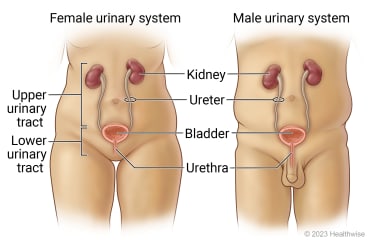What does your urinary system do?
The urinary system is the network of organs and tubes that process and carry urine out of the body. The kidneys and ureters are called the upper urinary tract. The bladder and urethra are called the lower urinary tract.
Your kidneys filter waste products and water from the blood to make urine. They also keep the proper balance of fluids and chemicals your body needs to work as it should.
Tubes called ureters carry urine from the kidneys to the bladder. The bladder stores the urine. When the bladder is full, the urine leaves the body through another thin tube, called the urethra.
What problems can happen with this system?
Urinary problems include:
- A urinary tract infection, or UTI. This is an infection anywhere between the kidneys and the urethra.
- Kidney stones. These are stones made of minerals in the urine that form in the kidneys. They are often tiny but can sometimes grow very large. They can cause blood in the urine and severe pain.
- Trouble urinating or not being able to urinate. Having an enlarged prostate may be a cause.
- Incontinence. This means you have trouble controlling the release of urine.
Common symptoms of a urinary problem include:
- A burning feeling when you urinate. This is the most common symptom of a UTI.
- An urgent need to urinate.
- Blood in the urine. Your urine may look red, brown, or pink.
- Incontinence.
Treatment for urinary problems depends on the cause. Your doctor may treat an infection with an antibiotic. Or you may need a procedure to help get rid of a kidney stone if it's too big to pass on its own.


